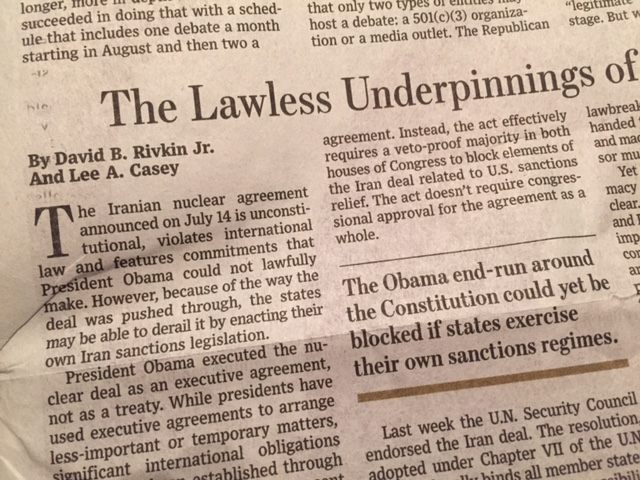On July 22, Breitbart News was the first to point out that the states have the power to block significant portions of the Iran deal, whether or not it passes Congress. That is because most states have enacted legislation divesting from Iran, and some, like New York, have even harsher legislation that prevents the state from doing business with the regime or with companies that do so.
In an op-ed in Monday’s Wall Street Journal, constitutional lawyers David B. Rivkin and Lee A. Casey agree: the states are “free to impose their own Iran-related sanctions.”
As Rivkin and Casey note in “The Lawless Underpinnings of the Iran Nuclear Deal,” the reason states have the power to stop the deal and to apply their existing sanctions, or even add new ones, is that President Barack Obama made an “end-run” around Congress by deciding not to submit the agreement as a treaty. Thanks to Ted Cruz’s litigation in Medellín v. Texas (2008), we know that international treaties–and, by implication, executive agreements–have no power over state law unless enabled by separate federal legislation, which does not yet exist.
Rivkin and Casey review the various ways in which the Iran deal skirts both U.S. constitutional and international law. They then note: “The administration faces another serious problem because the deal requires the removal of state and local Iran-related sanctions. That would have been all right if Mr. Obama had pursued a treaty with Iran, which would have bound the states, but his executive-agreement approach cannot pre-empt the authority of the states.”
As Breitbart News argued, the states could actually unravel the Iran deal, since it says that Iran will treat “an imposition of new nuclear-related sanctions, as grounds to cease performing its commitments.
Rivkin and Casey agree: “The Constitution’s Commerce Clause prevents states from imposing sanctions as broadly as Congress can. Yet states can establish sanctions regimes—like banning state-controlled pension funds from investing in companies doing business with Iran—powerful enough to set off a legal clash over American domestic law and the country’s international obligations. The fallout could prompt the deal to unravel.”
Regardless of whether they add new sanctions, states are unlikely to unravel their sanctions any time soon. (Notably, many of the states that have Iran sanctions are not “red” states, but are actually “blue” states where Democrats have taken a firm line against the Iranian regime.)
That will either prevent the U.S. from implementing its obligations under the deal, or it will import Obama’s lawlessness down to the state level. Expect state courts to resist–forcing the U.S. to seek a better deal, or forcing the confrontation with Iran that Obama has deferred.

COMMENTS
Please let us know if you're having issues with commenting.